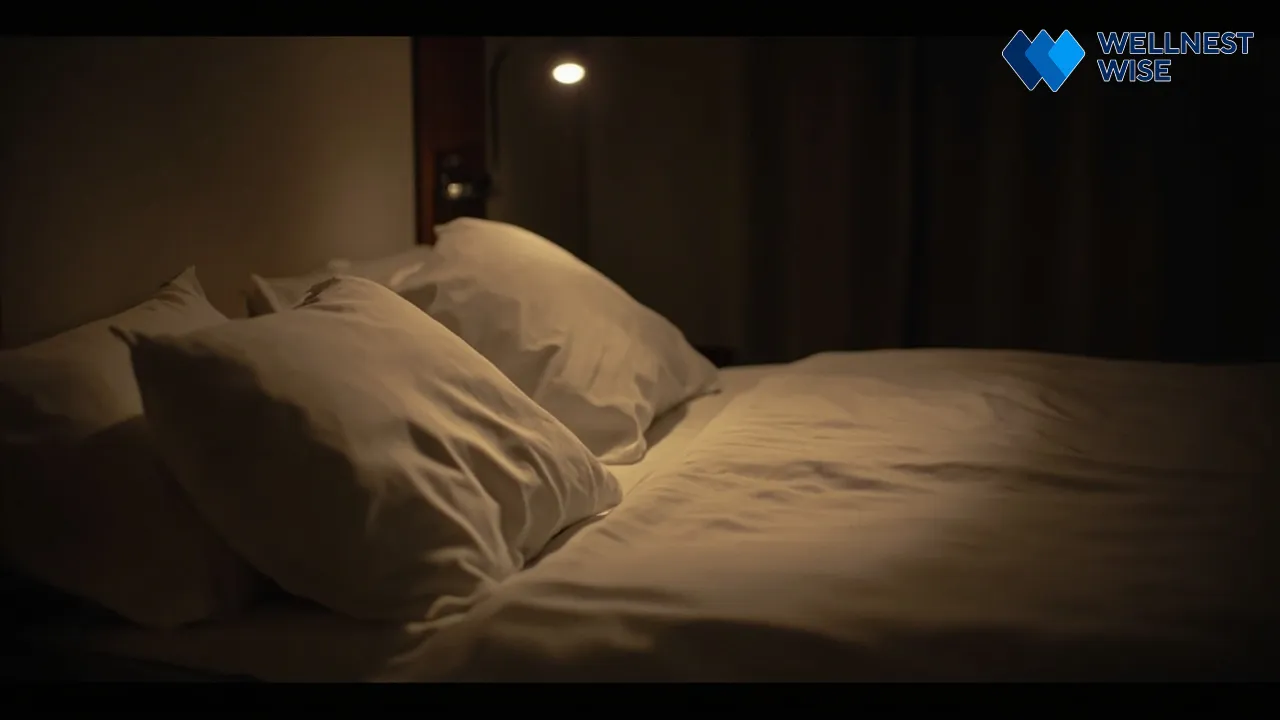Imagine ending your day feeling truly settled, ready for a night of deep, restorative sleep. Many busy individuals yearn for this peace, often feeling overwhelmed by the day’s demands right up until bedtime. But what if just 30 minutes could transform your evenings and significantly improve your sleep quality and stress levels? This article unveils a science-backed, yet surprisingly simple, nightly routine designed to help you wind down effectively and wake up refreshed.
The Science Behind Your Evening Wind-Down: Why 30 Minutes Matters
Before diving into what to do, understanding why a dedicated 30-minute nightly routine is so impactful can empower your commitment. This brief period isn’t just about relaxation; it’s a critical window where your body and mind transition from the day’s stimulation to a state primed for restorative rest. By respecting this transition, you actively engage your body’s natural sleep mechanisms, moving beyond mere stress relief to genuine physiological preparation for sleep.

Understanding the Biological Clock: Regulating Your Circadian Rhythm
Your circadian rhythm is your body’s internal 24-hour clock, orchestrating everything from hormone release to body temperature and, crucially, your sleep-wake cycle. A consistent evening wind-down routine helps reinforce this rhythm, signaling to your brain that it’s time to slow down. Without this clear signal, your body can remain in a state of alertness, making sleep initiation difficult and impacting the overall quality of your rest.
The Orchestration of Melatonin and Cortisol in Sleep-Wake Cycles
Central to your circadian rhythm are two key hormones: melatonin and cortisol. As evening approaches, natural melatonin levels begin to rise, inducing sleepiness. Conversely, cortisol, the stress hormone, typically peaks in the morning to promote alertness and gradually declines throughout the day. Disrupting this delicate balance – for instance, through late-night screen exposure – can suppress melatonin production and keep cortisol levels elevated, directly impairing your ability to fall asleep and stay asleep [NIH ODS].
Activating the Parasympathetic Nervous System for Deep Relaxation
Your nervous system has two main branches: sympathetic (“fight or flight”) and parasympathetic (“rest and digest”). During your sleep prep routine, the goal is to shift from sympathetic dominance, often fueled by daily stressors, to parasympathetic activation. Engaging in calming activities such as deep breathing or gentle stretching helps trigger this shift, lowering heart rate, relaxing muscles, and promoting a profound sense of tranquility necessary for deep sleep.
The Impact of Suboptimal Sleep Hygiene on Overall Well-being
Neglecting sleep hygiene—the habits and environmental practices conducive to sleeping well—can have far-reaching consequences beyond just feeling tired. Chronic poor sleep is linked to impaired cognitive function, mood disturbances, weakened immune response, and increased risk of metabolic issues. A consistent 30-minute nightly routine is a cornerstone of excellent sleep hygiene tips, actively safeguarding your physical and mental health.
Structuring Your Effective 30-Minute Sleep Prep Routine
Creating an effective quick bedtime routine doesn’t mean rigidly adhering to a prescribed set of actions; rather, it’s about designing a personalized framework that truly resonates with you. Think of this evening wind down routine as a flexible template, adaptable to your unique lifestyle while still providing the consistent cues your body needs to prepare for sleep. This structure provides psychological comfort, signaling the day is ending.

Defining Your Personal “Wind-Down Window”
Your “wind-down window” is the 30-minute period immediately preceding your desired bedtime. The key is to make this window non-negotiable, a sacred time dedicated to yourself. For instance, if you aim to be asleep by 10:30 PM, your sleep prep routine would begin at 10:00 PM. This clarity helps create a strong mental boundary between your active day and restful night.
Allocating Time: A Flexible Framework for Your Evening Rituals
While the “30-minute” duration is specific, how you allocate that time can vary. You might spend 10 minutes on light stretching, 10 minutes reading, and 10 minutes on a warm beverage. Or, perhaps 5 minutes of meditation, 15 minutes of journaling, and 10 minutes of gentle self-care. The flexibility allows you to adapt based on your daily energy levels and specific needs for that evening, ensuring the routine remains enjoyable and sustainable.
Essential Principles of a Quick Bedtime Routine
To maximize the effectiveness of your 30-minute nightly routine, integrate these core principles. They serve as foundational sleep hygiene tips that guide your choices and actions, helping to optimize your body’s natural preparation for sleep and reduce evening stress.
- Consistency is Key: Adhering to similar bedtimes and wake times, even on weekends, to reinforce circadian rhythm.
- Embrace Darkness: Dimming lights and minimizing stimulating visual input to signal melatonin production.
- Cultivate Calmness: Engaging in soothing activities that reduce mental and physical arousal, fostering relaxation techniques.
- Mindful Hydration: Consuming appropriate liquids that support relaxation without disrupting sleep, such as herbal teas.
- Digital Detox: Setting a clear boundary for screen time to avoid blue light exposure and mental stimulation, crucial for effective evening rituals.
Core Activities for a Restorative Nightly Routine
Within your 30-minute nightly routine, certain activities consistently prove beneficial for promoting relaxation and preparing the body for sleep. These aren’t just arbitrary suggestions; they are actions scientifically shown to help transition your mind and body from a state of alertness to one of calm. Personalizing these activities is crucial for creating an enjoyable and sustainable evening wind down routine.

Initiating a Digital Detox: Reducing Blue Light Exposure
In our modern world, screens are ubiquitous, but their blue light emissions can severely disrupt sleep by suppressing melatonin production. Starting your digital detox at the beginning of your 30-minute window is perhaps one of the most impactful changes you can make. This doesn’t mean total isolation; rather, a mindful shift away from stimulating devices.
Practical Strategies for Limiting Screen Time in Your Evening Rituals
Consider setting a “digital curfew” about an hour before your actual bedtime, giving yourself a buffer before the 30-minute nightly routine even begins. During your wind-down, swap your phone for a physical book, listen to an audiobook, or simply engage in conversation with family. If screens are unavoidable, use blue light filtering apps or glasses, though complete avoidance is ideal for truly effective sleep improvement strategies.
Cultivating Calmness: Mindfulness, Meditation, and Gentle Stretching
Once screens are off, the focus shifts to internal quiet. Mindfulness practices, even for just a few minutes, help anchor you in the present moment, reducing racing thoughts. This could be as simple as focusing on your breath or a guided meditation. Gentle stretching or Yin yoga can release physical tension, promoting both mental and bodily relaxation.
Simple Relaxation Techniques for Your Stress Relief Evening Routine
- Deep Breathing: Lie down and inhale slowly through your nose for 4 counts, hold for 7, and exhale slowly through your mouth for 8. Repeat for 5-10 minutes. This immediately activates the parasympathetic nervous system.
- Progressive Muscle Relaxation: Tense and then relax different muscle groups throughout your body, starting from your toes and working your way up to your head. This technique heightens body awareness and releases physical tension.
- Guided Imagery: Use an app or simply imagine yourself in a peaceful place, focusing on sensory details like sounds, sights, and smells. This can calm an anxious mind.
The Power of Warmth: Soothing Baths, Herbal Teas, and Comforting Elements
Warmth can be incredibly comforting and a powerful cue for relaxation. A warm bath or shower before bed can help your body temperature drop slightly afterwards, which is a signal for sleep. Similarly, a warm, non-caffeinated herbal tea can provide both a calming ritual and beneficial compounds.
Journaling for Mental Decompression: Processing the Day’s Thoughts
Often, a busy mind is the biggest barrier to sleep. Journaling for even 5-10 minutes during your evening wind down routine can be a profound practice for stress relief evening routine. It allows you to externalize worries, list unfinished tasks, or simply reflect on positive moments, clearing your mind before you try to sleep.
Nutritional Considerations for Optimizing Evening Relaxation
What you consume in the hours leading up to your 30-minute nightly routine can profoundly influence its effectiveness. The goal isn’t just to avoid disruptors, but to strategically choose foods and beverages that actively support your body’s natural sleep processes. Think of your evening nutrition as part of your overall sleep improvement strategies, directly impacting how quickly and deeply you rest.

Smart Snacking: Foods That Support Sleep vs. Those That Disrupt It
Opting for light, easily digestible snacks, if needed, is crucial. Foods rich in tryptophan (a precursor to serotonin and melatonin) like warm milk, bananas, or a small handful of almonds can be beneficial. Avoid heavy, fatty, or spicy meals close to bedtime, as they can lead to indigestion and discomfort, disrupting your quick bedtime routine.
When to Eat and When to Stop: Timing Your Last Meal for Better Sleep
For optimal sleep and digestive health, it’s generally advised to finish your last significant meal at least 2-3 hours before your 30-minute nightly routine begins. This allows your digestive system ample time to process food, preventing nighttime acid reflux or indigestion that can keep you awake. Research also suggests that restricting eating to earlier windows can improve metabolic health [Harvard, PMC].
Hydration for Sleep: Choosing the Right Evening Beverages
The beverages you choose in the evening play a critical role. While staying hydrated is important, certain drinks can act as stimulants or diuretics, directly counteracting your efforts to wind down.
- Recommended Beverages:
- Chamomile Tea: Contains apigenin, an antioxidant that may promote sleepiness.
- Warm Milk: Contains tryptophan, an amino acid precursor to serotonin and melatonin.
- Tart Cherry Juice: A natural source of melatonin and anti-inflammatory compounds.
- Plain Water: Essential for hydration without added stimulants or sugars.
- Beverages to Avoid:
- Caffeinated Drinks (Coffee, Black Tea, Energy Drinks): Stimulate the central nervous system, delaying sleep onset.
- Alcohol: Initially induces sleepiness but disrupts REM sleep and causes awakenings later in the night.
- Sugary Drinks: Can cause blood sugar spikes and crashes, disturbing sleep.
- Excessive Water Just Before Bed: May lead to nocturnal awakenings for urination.
Micronutrients and Macronutrients: Their Role in Sleep Improvement Strategies
Beyond avoiding disruptors, certain nutrients actively support sleep. Magnesium, found in leafy greens, nuts, and seeds, helps relax muscles and calm the nervous system. Calcium, present in dairy products, assists in the brain’s use of tryptophan to create melatonin. Complex carbohydrates can aid sleep by increasing tryptophan availability to the brain. A balanced diet throughout the day underpins all good sleep hygiene tips.
| Nutrient | Role in Sleep | Good Sources (Evening Friendly) | Why It Matters for Sleep |
|---|---|---|---|
| :————– | :———————————————— | :—————————————– | :——————————————————– |
| Magnesium | Muscle and nerve relaxation, stress reduction | Almonds, spinach, avocado, dark chocolate | Helps activate parasympathetic nervous system. |
| Calcium | Aids melatonin production | Milk, yogurt, fortified plant milks | Essential for the brain to use tryptophan for sleep. |
| Tryptophan | Precursor to serotonin and melatonin | Turkey, warm milk, nuts, seeds, bananas | Direct involvement in sleep-inducing hormone synthesis. |
| B Vitamins | Energy metabolism, neurotransmitter production | Whole grains, leafy greens, eggs | Crucial for overall brain function, including sleep cycles. |
| Complex Carbs | Stabilize blood sugar, aid tryptophan transport | Whole grain toast, small baked potato | Prevents sugar crashes and promotes consistent sleep. |
Sustaining Your 30-Minute Nightly Routine: Consistency and Adaptability
The true power of a 30-minute nightly routine lies not just in its initial implementation, but in its consistent practice. Building a new habit takes effort, but the long-term rewards for your sleep quality and overall well-being are immeasurable. Like tending a garden, it requires regular care and occasional adjustments to thrive.

Overcoming Common Barriers to Adherence
Life is unpredictable, and sticking to any new routine can be challenging. Common barriers include lack of time, forgetfulness, or a sudden change in schedule. Recognize that perfection isn’t the goal; rather, it’s consistent effort. If you miss a night, simply pick up where you left off the next evening without self-judgment.
Strategies for Maintaining Consistency in Your Sleep Prep Routine
- Set Reminders: Use an alarm on your phone (with a gentle, calming tone!) 30 minutes before your desired wind-down start time.
- Stack Habits: Link your new quick bedtime routine to an existing one, like brushing your teeth or washing your face.
- Prepare Ahead: Have your herbal tea ready, book open, or yoga mat laid out.
- Be Flexible: On particularly busy nights, shorten your routine to 15 minutes, focusing on the most essential elements like digital detox and deep breathing.
- Track Your Progress: Seeing tangible improvements in your sleep or morning energy can be a powerful motivator.
Personalizing Your Evening Rituals for Individual Needs and Lifestyles
One size does not fit all when it comes to evening rituals. Your perfect 30-minute nightly routine might look very different from someone else’s. Consider your unique daily stressors, energy levels, and personal preferences. If reading relaxes you more than meditation, lean into that. The routine should feel like a calming retreat, not another item on your to-do list.
Tracking Progress: Monitoring Sleep Quality and Stress Reduction
To truly understand the impact of your efforts, consider tracking your sleep. Simple methods include a journal noting when you fell asleep, woke up, and how refreshed you felt. Many wearable devices also offer sleep tracking. Over time, you’ll likely observe improved sleep quality and a noticeable reduction in evening stress relief evening routine benefits, affirming your dedication to these sleep improvement strategies.
Addressing Common Sleep Disruptors and When to Seek Expert Advice
Even with the most dedicated 30-minute nightly routine, life can throw curveballs that disrupt sleep. Understanding common culprits and knowing when your efforts might require professional intervention is key to truly optimizing your rest and overall well-being. Sometimes, even the best sleep hygiene tips aren’t enough to overcome deeper issues.

Identifying and Mitigating Environmental Factors
Your sleep environment plays a significant role. Noise, light, and temperature are common disruptors. Ensure your bedroom is dark (consider blackout curtains), quiet (earplugs or white noise can help), and cool (ideally 60-67°F or 15-19°C). An uncomfortable mattress or pillow can also impair sleep quality. Addressing these external factors complements your internal evening wind down routine.
When Your Quick Bedtime Routine Isn’t Enough: Recognizing Persistent Sleep Issues
While a 30-minute nightly routine is a powerful tool, it’s not a cure-all for chronic sleep disorders. If, despite consistent effort, you consistently struggle to fall asleep, stay asleep, or feel refreshed upon waking, it might be more than just poor sleep hygiene. Symptoms like loud snoring, gasping for air during sleep, or uncontrollable daytime sleepiness could indicate a more serious underlying condition.
The Role of a Sleep Specialist or Registered Dietitian in Deeper Interventions
If you suspect a persistent sleep issue, don’t hesitate to seek professional help. A sleep specialist can diagnose conditions like sleep apnea or insomnia and recommend tailored treatments. Similarly, if dietary choices seem to be a significant barrier to your sleep, a registered dietitian can provide personalized nutritional guidance, ensuring your diet supports, rather than hinders, your quest for better rest. These experts offer invaluable perspectives beyond general sleep improvement strategies.
Integrating Your Nightly Routine for Holistic Well-being
Embracing a 30-minute nightly routine is far more than just preparing for sleep; it’s an investment in your holistic well-being. This dedicated time creates a ripple effect, positively influencing your mental clarity, daily productivity, and long-term health. It transforms a simple habit into a foundational pillar of a balanced and fulfilling life.

Beyond Sleep: Benefits for Mental Clarity and Daily Productivity
Waking up after a truly restorative night’s sleep provides an undeniable boost in mental clarity. You’ll likely experience improved focus, enhanced problem-solving skills, and better decision-making throughout the day. This directly translates to increased daily productivity, less afternoon fatigue, and a greater capacity to handle challenges with a clear, calm mind—all direct outcomes of consistent sleep prep routine and proper sleep hygiene.
Long-Term Health Advantages of Consistent Sleep Hygiene Tips
The benefits extend far into the future. Consistent adherence to sleep hygiene tips and a 30-minute nightly routine has been linked to a reduced risk of chronic diseases such as heart disease, diabetes, and obesity. Better sleep supports a stronger immune system, improved hormonal balance (including regulation of cortisol and melatonin), and better mood regulation. It’s a fundamental aspect of preventive health care.
Empowering Yourself Through Mindful Evening Practices
Ultimately, establishing your evening wind down routine is an act of self-care and empowerment. It’s about consciously choosing to prioritize your health and well-being. By dedicating just 30 minutes each night to mindful practices, you gain control over your stress levels, enhance your sleep quality, and set the stage for a more energized, productive, and joyful tomorrow. Begin tonight, and feel the difference a focused stress relief evening routine can make.
Conclusion & Takeaways
Implementing a 30-minute nightly routine is a transformative step toward achieving better sleep and significantly reducing evening stress. By dedicating this brief, intentional window to science-backed activities like a digital detox, mindfulness, and mindful nutrition, you actively support your circadian rhythm, activate your parasympathetic nervous system, and enhance your overall sleep hygiene. This isn’t just about falling asleep faster; it’s about investing in your long-term health, mental clarity, and daily well-being. Start your personalized sleep prep routine tonight and unlock the profound benefits of truly restorative rest.
FAQ
Practical, scientific Q&A
Q1: How quickly can I expect to see results from a 30-minute nightly routine?
A1: While individual experiences vary, many people report noticing improvements in sleep quality and evening stress relief within a few days to two weeks of consistently implementing a 30-minute nightly routine. The body’s circadian rhythm benefits significantly from consistent cues, leading to faster adaptation and more immediate positive effects.
Q2: Is it okay to eat before my 30-minute nightly routine, or should I avoid food entirely?
A2: It’s generally recommended to finish your last substantial meal at least 2-3 hours before your sleep prep routine begins. A light, sleep-friendly snack (like a banana or small handful of almonds) is permissible if you’re truly hungry, but heavy or sugary foods should be avoided to prevent digestive discomfort and blood sugar spikes that disrupt sleep.
Q3: What if I don’t have a full 30 minutes every night? Should I still try to do a quick bedtime routine?
A3: Absolutely. Even 10-15 minutes of focused wind-down can make a significant difference. Prioritize the most impactful activities like a digital detox and a few minutes of deep breathing or mindfulness. Consistency, even in a shortened form, is more beneficial than skipping the routine entirely. Adaptability is key to sustaining good sleep hygiene tips.
Q4: How does blue light from screens specifically affect my sleep, and what’s the scientific reason for a digital detox?
A4: Blue light, emitted from electronic screens, signals to your brain that it’s daytime. This suppresses the natural production of melatonin, the hormone crucial for inducing sleep. By engaging in a digital detox during your evening wind down routine, you allow melatonin levels to rise naturally, signaling to your body that it’s time for sleep, thus supporting your circadian rhythm [NIH ODS].
Q5: Can this routine help with chronic stress, or is it only for occasional evening stress?
A5: While a 30-minute nightly routine is excellent for immediate stress relief evening routine and preventing evening anxiety, its consistent practice can also contribute to better management of chronic stress. By regularly activating your parasympathetic nervous system and improving sleep quality, you enhance your body’s resilience to stress hormones like cortisol over time, fostering a more balanced emotional state.













